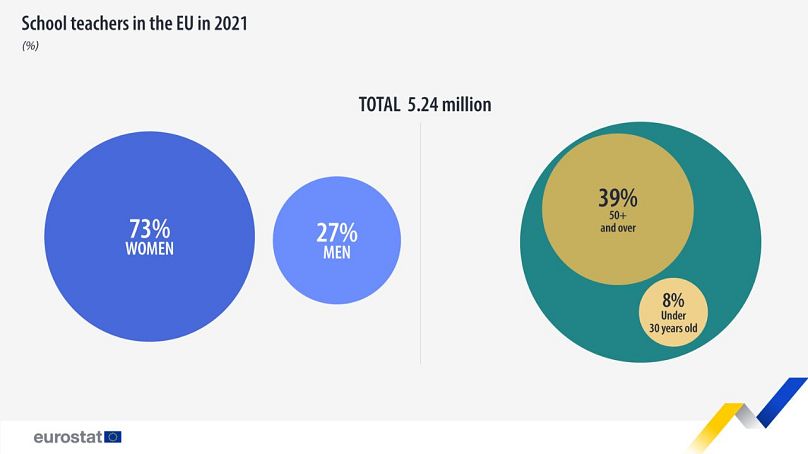Most EU member states see a large proportion of their teaching vacancies unfilled at the start of each school year, often thanks to low wages, high workload, and an ageing teacher population.
As the school year starts across the EU, 24 member states are struggling with teacher shortages, impacting students’ learning and hindering the goal of providing quality education for all.
Sweden has been reported as one of the worst affected, with 153,000 qualified teachers needed by 2035.
Only Croatia and Cyprus did not report a lack of education staff, according to the European Commission's Education and Training Monitor 2023 report, while Greece's existing public data does not allow it to assess whether all needs are covered or if specific subjects might suffer shortages.
Most countries face teacher shortages specifically in STEM subjects and qualified personnel in early childhood education and care.
Germany's Education and Science Workers' Union, GEW, has warned "against lowering the standards for pedagogical qualifications to compensate for the shortage of staff."
So why is this problem so bad, and how has it taken hold across the EU?
What are the obstacles?
The teaching profession suffers from various unattractive problems, among them low pay, job insecurity and high workload.
Gauthier Catteau was a Geography teacher in the French-speaking part of Belgium. He started his teaching career when he was 22.
When he turned 29, Catteau quit being a teacher and moved to engineering. Before that, he once found himself teaching in front of 39 teenagers.
"I was commuting three hours back and forth to go to school every day because I live in the countryside," he said. "And I chose to work in Brussels because it gave me some security."
The commuting distance, high workload, and limited career prospects started to look incompatible with his eagerness to start a family.
In 2021, only 8% of the total teaching workforce were younger than 30 years old, according to Eurostat.
The integration of Ukrainian children into EU schools due to the war has also exacerbated the problem of teacher shortage in Europe.
In Poland, in February 2023, 43,800 displaced children from Ukraine were enrolled in early childhood education.
Meanwhile, many countries suffer from an ageing teacher population with a wave of retirements expected in the next few years, only adding futher pressure on the system.
In Portugal, one of the teachers' unions, Fenprof, estimates that between 4,700 and 4,800 teachers are going to retire — "the highest number in the millennium". The country will need more than 30,000 new professional educators by 2030.
An EU-wide solution?
The European Commission has promoted teacher mobility and rewarded innovative teaching practices with a prize as a way to tackle this shortage and restore the prestige of this profession.
Many EU countries have also tried to attract retirees back into the profession and filled the gaps with teachers on temporary contracts as a Band-Aid fix.
In April of this year, Ireland's ASTI General Secretary Kieran Christie said the Department of Education needed a "complete change in their thinking" to address the current shortage of teachers.
Christie has suggested a number of initiatives need to be implemented to incentivise teachers who have left Ireland to work abroad to come back.
However, an EU-level solution might be difficult to implement.
"One of the reasons why it is difficult to come up with a European comparable cross-country indicator on teacher shortage is because countries have different educational institutional rules," wrote education economist Giorgio Di Pietro in a technical report for the EU's Joint Research Centre.
"For instance, formal teaching qualifications can be obtained in different ways in different countries. In some countries, one automatically becomes a teacher when they complete the teacher preparation programme, while in others there are additional steps to complete."













